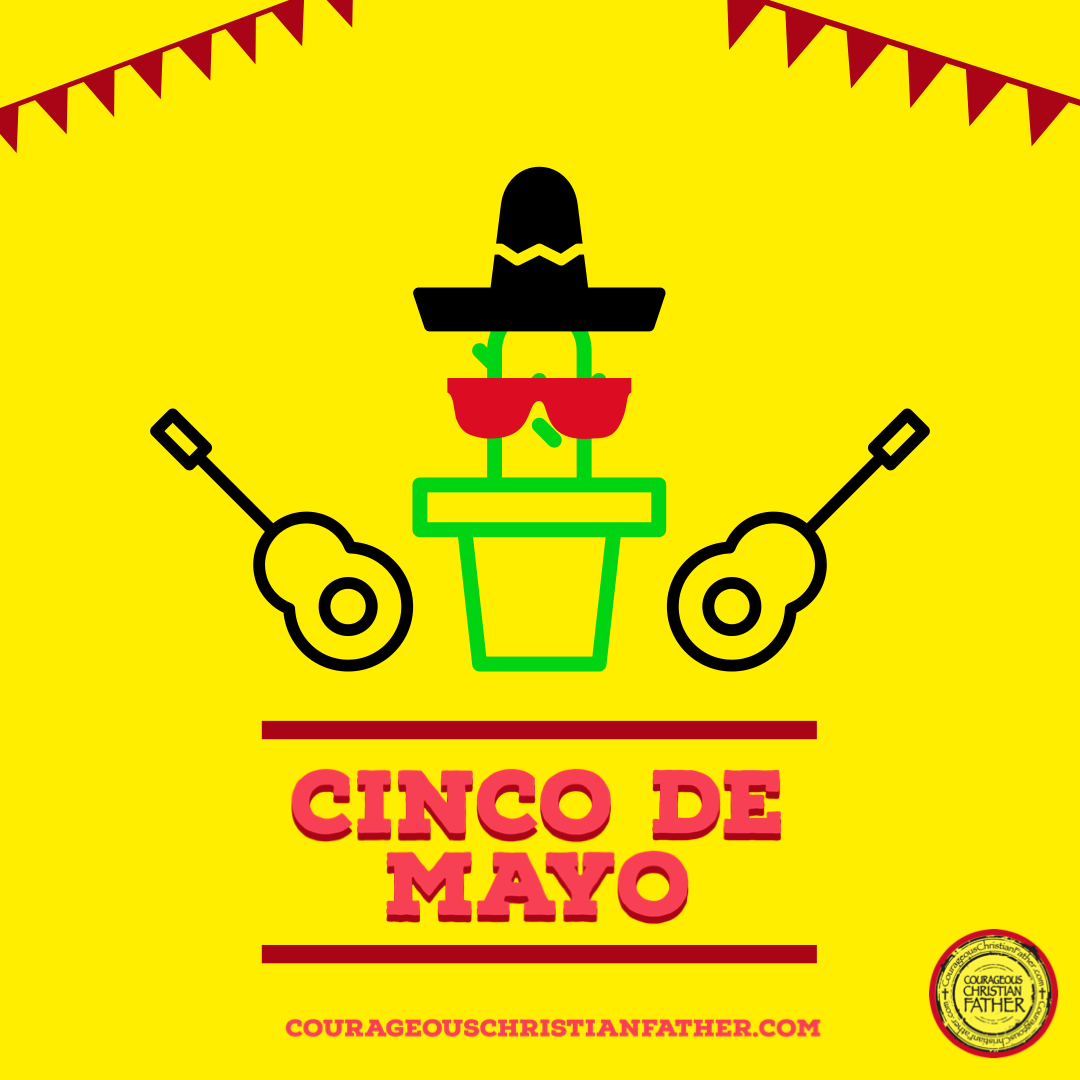Celebrating Cinco de Mayo: A Christian Perspective – Cinco de Mayo, which means “Fifth of May” in Spanish, is a holiday that originated in Mexico but has gained popularity and recognition around the world. While many people associate Cinco de Mayo with festive celebrations, delicious food, and vibrant parades, it is important for Christians to reflect on this occasion from a faith-centered perspective. In this blog post, we will explore Cinco de Mayo through the lens of our Christian beliefs and consider how we can find meaning and purpose in this cultural celebration.
Celebrating Cinco de Mayo: A Christian Perspective

- Embrace Cultural Diversity: As Christians, we are called to love our neighbors as ourselves (Mark 12:31). Cinco de Mayo provides a wonderful opportunity to embrace and appreciate the rich cultural diversity that God has bestowed upon humanity. Rather than simply engaging in surface-level festivities, we can take this day to learn about Mexican history, traditions, and contributions to society. By fostering a spirit of understanding and respect, we can break down barriers and promote unity among different cultures.
- Gratitude for Freedom: Cinco de Mayo commemorates the Mexican army’s victory over the French forces in the Battle of Puebla in 1862. This event symbolizes the struggle for freedom and independence. As Christians, we can reflect on the importance of freedom in our own lives. We have been set free from the bondage of sin through the sacrificial death and resurrection of Jesus Christ (Galatians 5:1). This holiday can remind us to be grateful for the freedom we have in Christ and to intercede in prayer for those who are still fighting for physical, emotional, or spiritual liberation.
- Unity and Solidarity: In celebrating Cinco de Mayo, we can also reflect on the significance of unity and solidarity. The Battle of Puebla was won by a relatively small and under-equipped Mexican army because they united in their common cause. As Christians, we are called to be united as the body of Christ, supporting and encouraging one another (1 Corinthians 12:12-14). Cinco de Mayo can remind us to foster unity within our churches and communities, standing together against the forces that seek to divide us.
- Sharing God’s Love: Cinco de Mayo celebrations often involve gatherings with family and friends, enjoying traditional food, and participating in festive activities. As Christians, we can use these opportunities to share God’s love with others. By extending hospitality, engaging in conversations, and demonstrating Christ-like love, we can be a witness for our faith. Let us remember that our faith is not confined to the walls of the church but should be lived out in our interactions with others, including during cultural celebrations like Cinco de Mayo.
Cinco de Mayo – literally translate as 5th of May. This is a holiday mostly celebrated in Mexico to commemorate the Mexican Army’s difficult victory over the French Empire at the Battle of Puebla, on May 5, 1862.
Cinco de Mayo
This battle was done under the leadership of General Ignacio Zaragoza. On this day you can find all kinds of festivities that include parades, food, music and folklore dancing. However, in the United States, this holiday is to celebrate Mexican-American culture. Some people think it is Mexico’s Independence Day, which it is not. That is celebrated September 16.

Lesser-known facts
While Cinco de Mayo is widely recognized and celebrated, there are some lesser-known facts about this holiday that may surprise you. Here are a few intriguing facts about Cinco de Mayo:
- Not Mexico’s Independence Day: Contrary to popular belief, Cinco de Mayo is not Mexico’s Independence Day. Mexico celebrates its independence from Spanish rule on September 16th. Cinco de Mayo specifically commemorates the Mexican victory over the French in the Battle of Puebla on May 5, 1862.
- Regional Significance: Cinco de Mayo is primarily celebrated in the state of Puebla in Mexico, where the battle took place. While it has gained recognition throughout Mexico, it is not observed as a national holiday to the same extent as other significant dates.
- Symbol of Mexican Resistance: The Battle of Puebla, which Cinco de Mayo commemorates, was a momentous victory for Mexico. The Mexican army, led by General Ignacio Zaragoza, defeated the larger and better-equipped French forces. This triumph represented a symbol of Mexican resistance against foreign intervention.
- International Recognition: Cinco de Mayo gained popularity beyond Mexico’s borders due to Mexican immigrants in the United States. In the 1960s, the Chicano movement, aimed at promoting Mexican-American pride and civil rights, embraced Cinco de Mayo as a way to celebrate Mexican heritage and culture.
- Influence of Tequila: Tequila, a popular alcoholic beverage made from the blue agave plant, is often associated with Cinco de Mayo celebrations. However, it is interesting to note that the production of tequila occurs in specific regions of Mexico, primarily in the state of Jalisco.
- Ballet Folklórico: Traditional Mexican dance forms, such as Ballet Folklórico, play a significant role in Cinco de Mayo festivities. These vibrant and colorful performances showcase the diversity and cultural richness of Mexico.
- Unique Celebrations: While Cinco de Mayo is often associated with lively parades, music, and dance, the way it is celebrated can vary across different regions and communities. In Mexico, celebrations may include reenactments of the Battle of Puebla, military parades, and patriotic speeches.
- Mexican Cuisine: Cinco de Mayo offers an opportunity to savor and appreciate the delicious flavors of Mexican cuisine. From tacos and enchiladas to guacamole and salsa, the holiday is a perfect occasion to indulge in traditional Mexican dishes.
- Historical Impact: The Battle of Puebla, although not a definitive victory against the French, was a significant moment in history. It delayed French intervention in Mexico and had broader implications, as it provided encouragement and inspiration to other nations struggling against imperialism.
- Cultural Exchange: Cinco de Mayo has become a platform for cultural exchange, where people from various backgrounds come together to appreciate Mexican culture, music, and food. It offers an opportunity to foster understanding and celebrate diversity.
As you celebrate Cinco de Mayo, remember these lesser-known facts to deepen your understanding of this holiday and engage in meaningful conversations or even use it as a witnessing conversation.
In Conclusion, As Christians, we have a unique perspective to bring to cultural celebrations like Cinco de Mayo. By embracing diversity, expressing gratitude for freedom, promoting unity, and sharing God’s love, we can infuse this holiday with deeper meaning and purpose. Let us use this occasion as an opportunity to build bridges, foster understanding, and reflect the light of Christ in all that we do. May our celebrations be a testament to the transformative power of our faith and a demonstration of the love of God to those around us.
Part of this article is from MetroCreative. TF185988 & TF215950 – First published May 4, 2018. Last updated or republished May 5, 2024.
Check out Courageous Christian Father’s Wish list on Amazon where you can purchase and this items sent directly to him and they will be used for the ministry.
Subscribe To Courageous Christian Father!
Don’t miss any blog posts! Subscribe today! You can subscribe via WordPress or by entering your email! Thank you!
Follow Courageous Christian Father on WordPress.comFollow Courageous Christian Father on Social Media
Recent Posts:
Below are some examples of blog entries from all the blogs that I do. (Courageous Christian Father, Steve Sews Stuff, SteveZ DuckZ, and SteveZ DesignZ).
Thank You For Reading Courageous Christian Father!
Thank you for reading. Please feel free to share and like this blog post.
Clipart: Unsplash, Pixabay, Pexels, Openverse, Adobe Express, Adobe Stock, FreePik, MetroCreative, and more. This site uses Amazon Affiliate Ads & Google Ads.
About the Author
Discover more from Courageous Christian Father
Subscribe to get the latest posts sent to your email.


